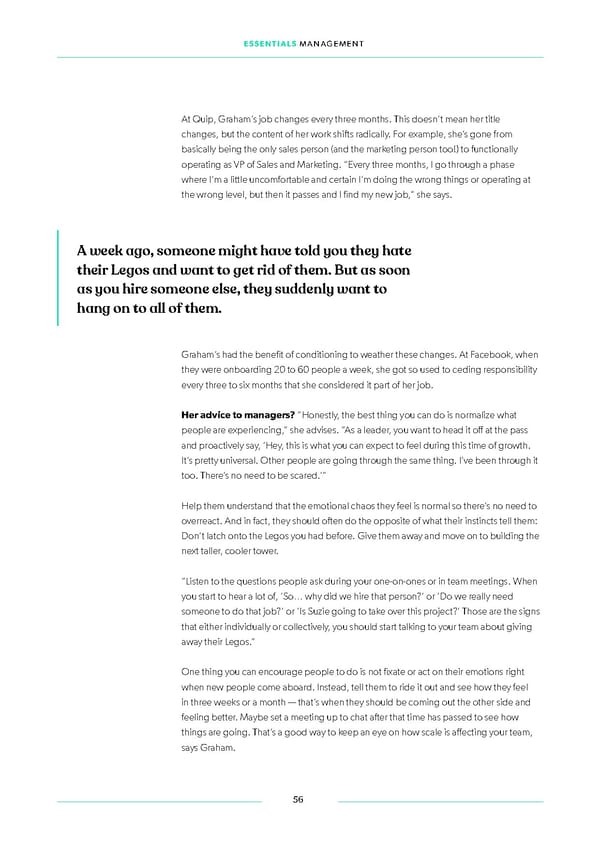ESSENTIALS MANAGEMENT At Quip, Graham’s job changes every three months. This doesn’t mean her title changes, but the content of her work shitfs radically. For example, she’s gone from basically being the only sales person (and the marketing person too!) to functionally operating as VP of Sales and Marketing. “Every three months, I go through a phase where I’m a little uncomfortable and certain I’m doing the wrong things or operating at the wrong level, but then it passes and I ifnd my new job,” she says. A week ago, someone might have told you they hate their Legos and want to get rid of them. But as soon as you hire someone else, they suddenly want to hang on to all of them. Graham’s had the beneift of conditioning to weather these changes. At Facebook, when they were onboarding 20 to 60 people a week, she got so used to ceding responsibility every three to six months that she considered it part of her job. Her advice to managers? “Honestly, the best thing you can do is normalize what people are experiencing,” she advises. “As a leader, you want to head it off at the pass and proactively say, ‘Hey, this is what you can expect to feel during this time of growth. It’s pretty universal. Other people are going through the same thing. I’ve been through it too. There’s no need to be scared.’” Help them understand that the emotional chaos they feel is normal so there’s no need to overreact. And in fact, they should otfen do the opposite of what their instincts tell them: Don’t latch onto the Legos you had before. Give them away and move on to building the next taller, cooler tower. “Listen to the questions people ask during your one-on-ones or in team meetings. When you start to hear a lot of, ‘So… why did we hire that person?’ or ‘Do we really need someone to do that job?’ or ‘Is Suzie going to take over this project?’ Those are the signs that either individually or collectively, you should start talking to your team about giving away their Legos.” One thing you can encourage people to do is not ifxate or act on their emotions right when new people come aboard. Instead, tell them to ride it out and see how they feel in three weeks or a month — that’s when they should be coming out the other side and feeling better. Maybe set a meeting up to chat atfer that time has passed to see how things are going. That’s a good way to keep an eye on how scale is affecting your team, says Graham. 56
 Essentials Management First Round Capital Page 55 Page 57
Essentials Management First Round Capital Page 55 Page 57